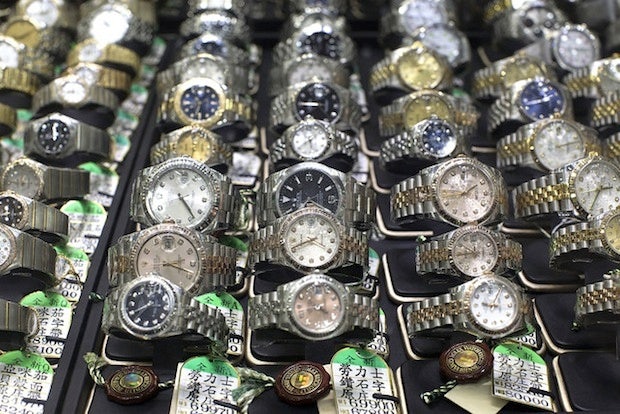"Entry-Level" Customers Seek Alternatives To High Mainland Prices#

Rolex watches at a pawn shop in Macau. Typically pawned items like antiques and jewelry are being joined at a more frequent rate by handbags and watches. (Bloomberg)
As secondhand luxury loses its stigma in China, this year saw more customers--especially young ones--turning to pawn shops for luxury goods, according to a source from Shanghai Business Daily.
In the past, most pawned goods were traditional items, such as gold, jewelry, antiques, paintings, or jade. In recent years, however, internationally popular luxury goods such as high-end watches, boutique bags, and diamonds have become part of the mainstream pawn market.
This luxury buying method is gaining in popularity for several reasons. First of all, it is seen as an alternative to purchasing items of dubious authenticity in the world of online secondhand shopping. According to shop employees, buying secondhand luxury in a physical store makes customers feel more secure than buying online, especially with the addition of perks such as free after-sales service.
The most obvious reason, however, is of course the dramatically lower price that pawn shop luxury goods command as compared to new items, especially with the country's high taxes on luxury. In a growing trend, big ticket items are sold through auctions. For instance, the article cites a Hermès handbag which was originally sold for more than 400,000 yuan in store, but was auctioned for a still costly, but much lower price of 274,000 yuan.
The article's reporter found that pawned goods up for auction are often overdue items which have not been foreclosed by clients. The starting price is typically much lower than the market price, and the lowest discount can reach 65 percent. In terms of authenticity, according to people familiar with the matter, pawn shops hire professional appraisers to evaluate pawned luxury items before they go to auction.
With possessing luxury goods becoming more of a symbol of quailty of one's life in China, some customers have become used to pawning their own luxury possessions and buying a few others at cheaper prices in pawn shops. In fact, for many of China's young, "entry-level" luxury fans who earn a limited income, turning to pawn shops is an economical choice for acquiring favorite international brands at a substantial discount.
The article also found that some consumers who do have the income to afford full-price goods are opting for pawn shop deals. According to one customer, "...now, the first choice for me to buy luxury goods is a pawn shop. If I cannot not find anything satisfactory, I will go to a boutique."